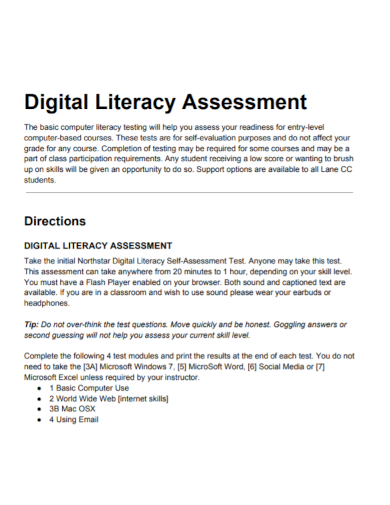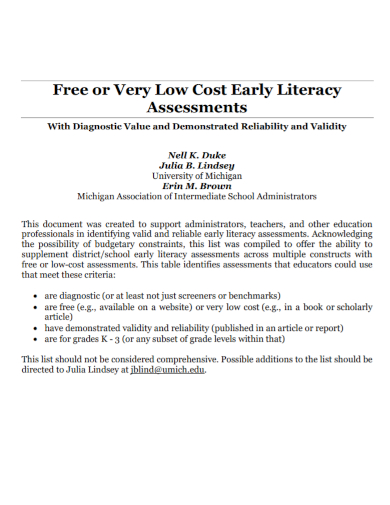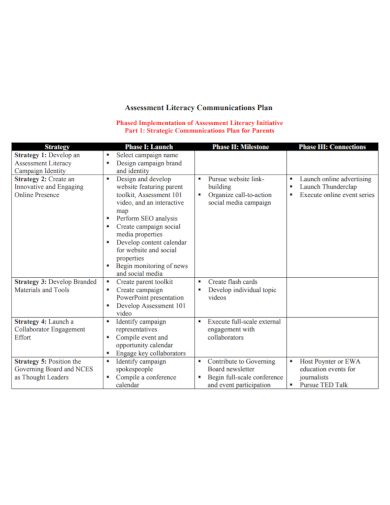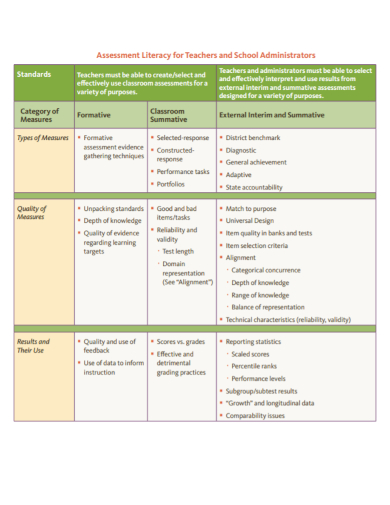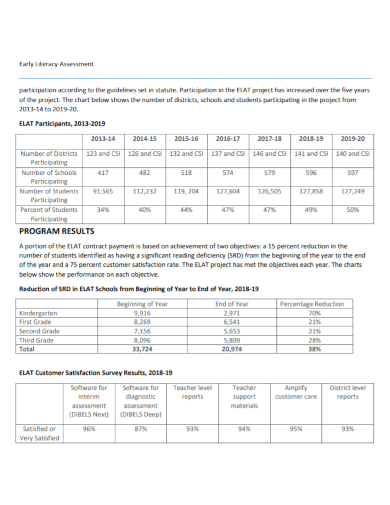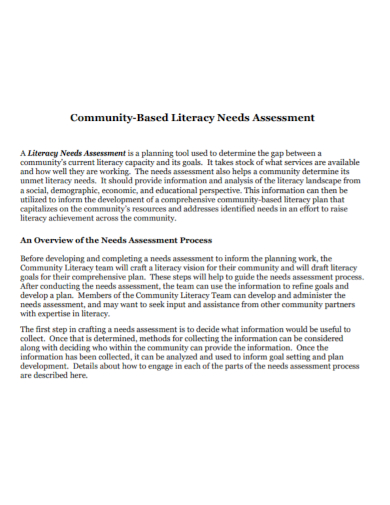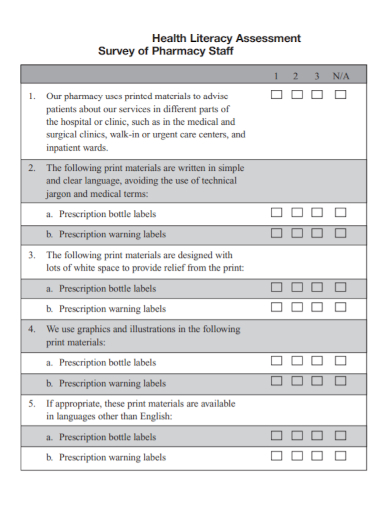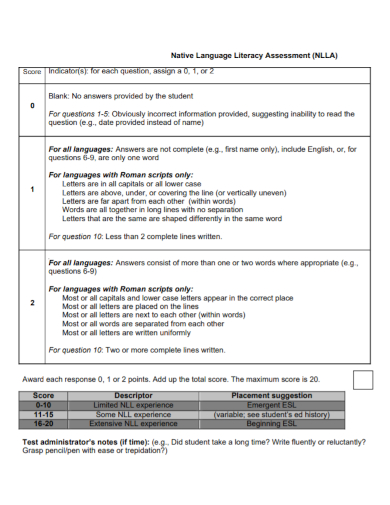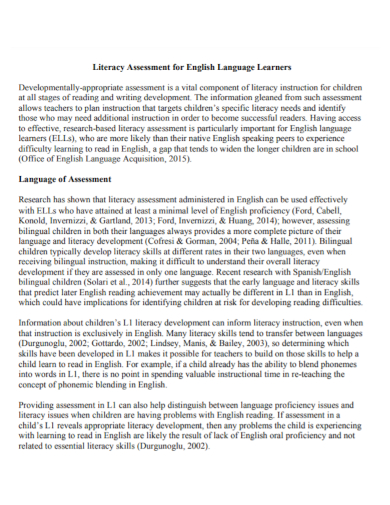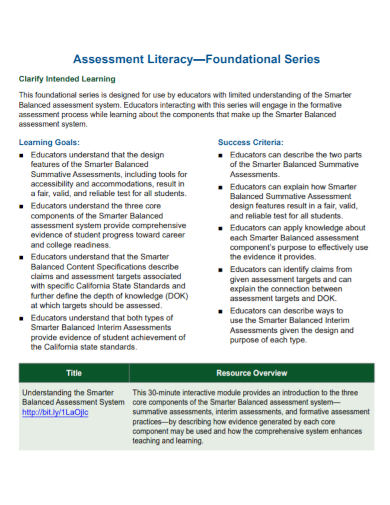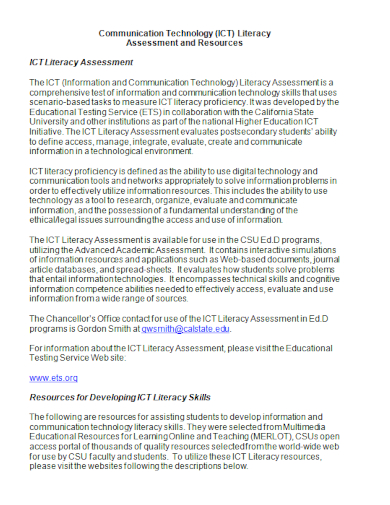It was stated that in the National Council of Techers of English, they believe that having a literacy assessment could be an essential instrument to be used in teaching and learning literacy as it contributes to the various conditions of literacy teaching and learning and that professional knowledge about the assessment is considered as a critical component for the development and practice of a literacy teacher.
10+ Literacy Assessment Samples
1. Digital Literacy Assessment
2. Low-Cost Early Literacy Assessment
3. Literacy Communications Plan Assessment
4. School Teacher Literacy Assessment
5. Early Literacy Assessment
6. Community Literacy Needs Assessment
7. Health Literacy Assessment
8. Native Language Literacy Assessment
9. Language Learners Literacy Assessment
10. Foundational Literacy Assessment
11. Communication Technology Literacy Assessment
Most of the educators would think that high-stake tests would completely help a student to make a progress when having to meet a particular standard in education. It would probably make sense especially to the educational assessment centers who would strongly stand for high-stake testing. High-stakes tests are just a part of the assessment procedures that are being conducted in schools. However, there are a lot of assessments that influence the instructional decisions.In order for you to understand literacy assessment, we should know first the word literacy.
Literacy is defines as something that is incorporated with the ability to read and write. As time goes by, it has evolved to encompass other multidimensional abilities such as speaking, listening, viewing, and performing. It also observes cultural and societal aspects that can help in facilitating the development of literacy. This definition of literacy would require educators and policy makers to come up with a concept of literacy.
There have been a lot of controversies pertaining to literacy when it has been oversimplified by assessments that are not even authentic. Educators would also find the lack of authenticity of the assessments when there would be instances that the results do not actually represent what their students know and what they can possibly do. However, there are those that are considered authentic assessments methods like observing students during a group discussion.
There is what we call the “Principle of Literary Assessment”.
- Literacy assessment is a type of social process in which all of the student texts are assessed by knowledgeable humans.
- Literacy assessments assume classroom learning context that includes assessments that focuses on strengths, areas of concern, actions taken and for the improvement of skills.
- Literacy assessments are meaningful by nature.
- Literacy assessments should have more cognitive activities and practices that includes belief in literacy, dispositions, and self-efficacy.
- Literacy assessments are valid due to the fact that it helps in facilitating the learning of the students.
- Literacy assessments are purposeful and are designed to have just one purpose.
- Literacy assessments consider every kinds of diversity, may it be in language, learning style, or routes of learning.
- Literacy assessments includes different measures of domains like texts, processes, and reflection.
Definition of Literacy Assessment
A literacy assessment pertains to the decision-making process that results in the examination of the performance of every student on each of the literacy tasks. This aspect includes assessments which would cover from formative response to student writing to higher-stakes assessment.
FAQs
What is the purpose of an assessment?
The purpose of an assessment is to identify skills that needs to be reviewed, monitor student progress, guide teacher instruction, demonstrate how effective is the instruction, and to provide teachers with the needed information on how a particular instruction can be improved.
What are some of the considerations when selecting an assessment?
We have to consider the diversity among students. Some of the measures that is used for the data collection are appropriate only for a specific age level, skill level, and culture. Some of the teachers would prefer having multiple assessments when they have to gather information with regards to the student performance. There are also different measures that provide distinct information. This would encourage teachers to implement assessments that will be able to provide information pertaining to the students’ skills. Students having disability will also receive special education services.
Even though the literacy assessment that uses multiple choice items compared to having an authentic procedure seems like they really are not the same, they still have common features. Both of them can give answers to most of the educational questions. But, it basically depends on the question being asked. If you want to see more samples and format, check out some of the literacy assessment samples and templates to be guided.
Related Posts
FREE 10+ Event Risk Assessment Samples in PDF | MS Word
FREE 10+ Joint Assessment Samples [ Strategic, Risk, Needs ]
FREE 10+ Teleworker Self-Assessment Samples in PDF | DOC
FREE 10+ Market Assessment Samples in PDF | MS Word
FREE 10+ Quality Risk Assessment Samples [ Control, Assurance, Management ]
FREE 6+ Immediate Termination of Lease Agreement Samples in MS Word | Google Docs | Apple Pages | PDF
FREE 10+ Qualitative Risk Assessment Samples in PDF | DOC
FREE 10+ Comprehensive Needs Assessment Samples in PDF
FREE 10+ Evaluation Quality Assessment Samples [ Self, Loss, Data ]
FREE 10+ Promotion Assessment Samples [ Health, Self, Employee ]
FREE 10+ Environmental Impact Assessment Samples in PDF | DOC
FREE 10+ Employee Competency Assessment Samples in PDF | DOC
FREE 10+ Safety Assessment Samples [ Home, Health, Risk ]
FREE 10+ Change Impact Assessment Samples [ Management, Control, Request ]
FREE 10+ Qualitative Assessment Samples in PDF | DOC

